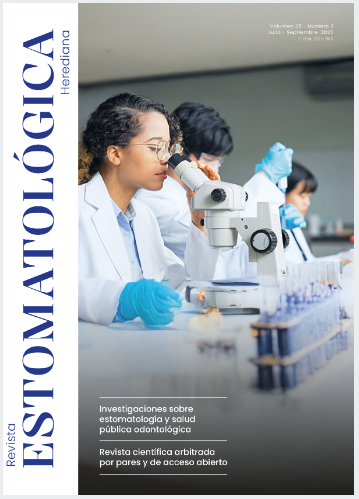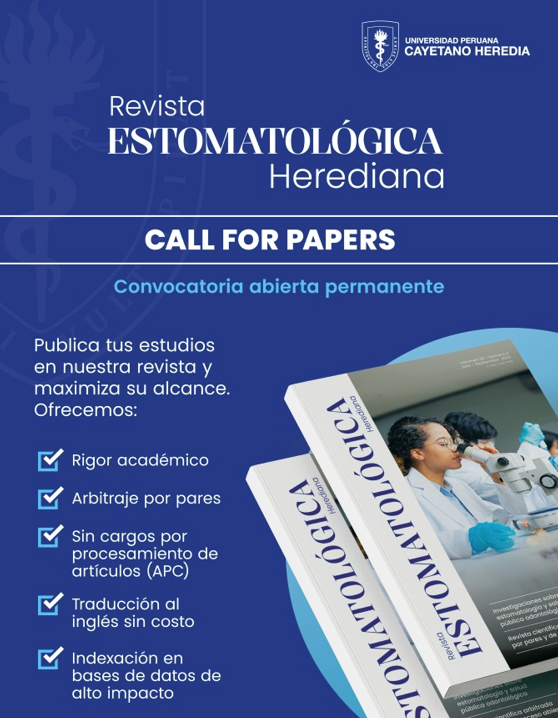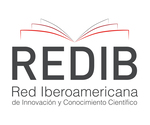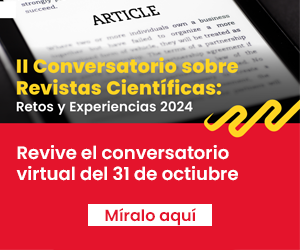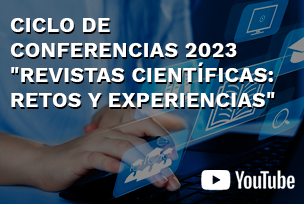An epidemiological surveillance system for COVID-19 in a dental teaching center between 2021 and 2023
DOI:
https://doi.org/10.20453/reh.v35i3.7108Keywords:
COVID-19, health sciences, epidemiologyAbstract
Objective: To describe the follow-up of epidemiological surveillance of COVID-19 positive cases in a dental teaching center in Peru between 2021 and 2023. Materials and methods: A cross-sectional study was conducted as part of a COVID-19 surveillance plan in a dental teaching center of a Peruvian university. The study was conducted between June 2021 and April 2023, reaching a total of 1,623 records, in which students and faculty members participated. Results: A total of 120 COVID-19 positive cases were reported during the surveillance period, with the highest peak observed during the third wave. The results showed that the year with the highest number of cases was 2022, accounting for 92.5% (n = 111), and the most affected group was that of postgraduate students, representing 57.5% (n = 69). Conclusions: This study highlights the importance of implementing effective epidemiological surveillance systems in clinical-educational settings, particularly during public health emergencies such as the COVID-19 pandemic. The collected data revealed that most positive cases were concentrated during the third wave, particularly among postgraduate students, highlighting the urgent need to strengthen preventive measures in these high-risk groups. The absence of reported cases in the first four months of 2023 suggests successful containment, mainly attributed to the implementation of strict biosafety protocols and the progress of vaccination. Epidemiological surveillance systems must remain up to date to ensure a safe environment for all those involved.
Downloads
References
Organización Mundial de la Salud. Información básica sobre la COVID-19 [Internet]. OMS; 2023, 28 de marzo. Disponible en: https://www.who.int/es/news-room/questions-and-answers/item/coronavirus-disease-covid-19
Organización Panamericana de la Salud. Actualización epidemiológica: Enfermedad por coronavirus (COVID-19) [Internet]. OPS; 2021, 21 de agosto. Disponible en: https://www.paho.org/es/documentos/actualizacion-epidemiologica-enfermedad-por-coronavirus-covid-19-21-agosto-2021
Hung LS. The SARS epidemic in Hong Kong: what lessons have we learned? J R Soc Med [Internet]. 2003; 96(8): 374-378. Disponible en: https ://doi.org/10.1177/014107680309600803
Ibrahim NK. Epidemiologic surveillance for controlling COVID-19 pandemic: types, challenges and implications. J Infect Public Health [Internet]. 2020; 13(11): 1630-1638. Disponible en: https://doi.org/10.1016/j.jiph.2020.07.019
Rodriguez M, Barahona N, de Moya Y. Importancia de la vigilancia epidemiológica en el control de las infecciones asociadas a la atención en salud. Biociencias [Internet]. 2019; 14(1): 65-81. Disponible en: https://doi.org/10.18041/2390-0512/biociencias.1.5440
López WE, Huerta AM, Flores M. Docencia en ambientes clínicos odontológicos: un acercamiento desde las estrategias de enseñanza. Rev Investig Educ Esc Grad Educ [Internet]. 2015, 5(10): 2-7. Disponible en: https://rieege.mx/index.php/rieege/article/view/138
Estomatología Cayetano. Sobre el Centro Dental Docente [Internet]. UPCH; [s. f.]. Disponible en: https://estomatologia.cayetano.edu.pe/centro-dental-docente/nosotros/
Delgado NJ, Gomez AM, Miranda AL. Plan de vigilancia de COVID-19 en un centro dental docente peruano [tesis de licenciatura en Internet]. Lima: Universidad Peruana Cayetano Heredia; 2023. Disponible en: https://hdl.handle.net/20.500.12866/13648
Sierra MJ, Martínez EV, Monge S, García L, Suárez B, Simón F. Lecciones de la vigilancia de la COVID-19. Necesidad urgente de una nueva vigilancia en salud pública. Informe SESPAS 2022. Gac Sanit [Internet]. 2022; 36(suppl 1): S68-S75. Disponible en: https://doi.org/10.1016/j.gaceta.2022.03.001
Araujo-Castillo RV. Dos años de pandemia, una batalla que aún no termina. Acta Méd Peru [Internet]. 2022; 39(1): 3-6. Disponible en: https://doi.org/10.35663/amp.2022.391.2374
Martins C, Santinoni C, Moraes L, Catelan A, Monteiro DR, Mori G, et al. An overview of dentistry during and after the COVID-19 pandemic period in Brazil. Res Soc Dev [Internet]. 2022; 11(3): e28011323419. Disponible en: http://dx.doi.org/10.33448/rsd-v11i3.23419
Ren SY, Wang WB, Gao RD, Zhou AM. Omicron variant (B.1.1.529) of SARS-CoV-2: mutation, infectivity, transmission, and vaccine resistance. World J Clin Cases [Internet]. 2022, 10(1): 1-11. Disponible en: http://dx.doi.org/10.12998/wjcc.v10.i1.1
Smallwood N, Harrex W, Rees M, Willis K, Bennett C. COVID-19 infection and the broader impacts of the pandemic on healthcare workers. Respirology [Internet]. 2022; 27(6): 411-426. Disponible en: https://doi.org/10.1111/resp.14208
Koelle K, Martin MA, Antia R, Lopman B, Dean NE. The changing epidemiology of SARS-CoV-2. Science [Internet]. 2022; 375(6585): 1116-1121. Disponible en: https://doi.org/10.1126/science.abm4915
Mathew M, Sebastian J, Doddaiah N, Thomas A, Narayanappa S. Clinico-epidemiological profile and outcome of infected health care workers during the three consecutive waves of COVID-19 pandemic: a longitudinal cohort study. Ther Adv Vaccines Immunother [Internet]. 2023; 11. Disponible en: https://doi.org/10.1177/25151355231181744
Downloads
Published
How to Cite
Issue
Section
License
Copyright (c) 2025 Marie Ramirez-Revollar, Daniel Kevin Pérez-Alvarez, Neila Quiroz-Silva, Roberto A. León-Manco

This work is licensed under a Creative Commons Attribution 4.0 International License.
The authors retain the copyright and cede to the journal the right of first publication, with the work registered with the Creative Commons License, which allows third parties to use what is published as long as they mention the authorship of the work, and to the first publication in this journal.
